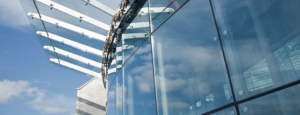 Advancements in insulated glass, and increased regulations regarding carbon emissions, are expected to grow the sales of energy efficient glass into the next decade. According to BIS Research, a market research firm located in Bloomington, Minn. that specializes in emerging technologies, the global energy efficient glass market is expected to reach about $18 billion by 2026, which represents a nearly 20 percent increase from 2016.
Advancements in insulated glass, and increased regulations regarding carbon emissions, are expected to grow the sales of energy efficient glass into the next decade. According to BIS Research, a market research firm located in Bloomington, Minn. that specializes in emerging technologies, the global energy efficient glass market is expected to reach about $18 billion by 2026, which represents a nearly 20 percent increase from 2016.
Analyst Nikita Kheterpal says that so-called “active technologies” will dominate the energy efficient glass market in future years. Also known as “smart glass,” these are technologies “proven to be the most energy efficient” in glass, such as those that require user-controlled switches to regulate tint levels or to control the levels of heat penetration. Kheterpal says that active technologies represented about 83 percent of the global market in 2016 and will reach $15 billion by 2026.
Energy efficient glass is most prominent in North America. However, the European market is expected to dominate the market by 2026 due to a growing adoption rate, the region’s sustainability goals for 2020, 2030, and 2050, and its growing glass, transportation, and construction industries.
That said, demand is growing in emerging nations such as China, India, Brazil, among others. Demographic changes there due to growing urbanization and disposable income has created a stronger demand for smart glass, which is expected to boom into the next decade.
BIS Research reports that energy efficient glass is primarily used in end-user industries, meaning those products or services that are used for their designed purpose, such as transportation, building and construction, power generation, and consumer electronics.
Transportation, which includes automotive, aerospace and marine, dominated the end-user market for energy efficient glass in 2016, representing 45 percent of the total market, which is expected to reach $8 billion by 2016, a 20 percent jump. Smart glass is ideal for this sector because it offers a significant reduction in fuel consumption and provides greater passenger comfort and safety. The automotive industry has also responded to the consumer demand for greater energy efficiency in its vehicles, which is contributing to driving the demand for smarter glass.
What is your experience in the smart glass market? How have your responded to greater demand? Are you planning to invest more in smart glass production? Let us know in the comments below!

